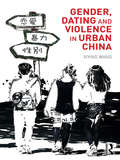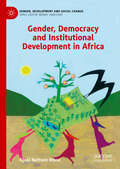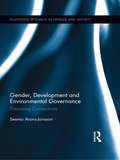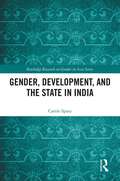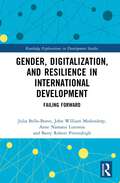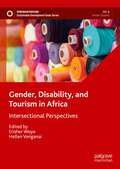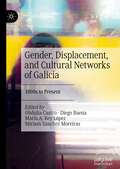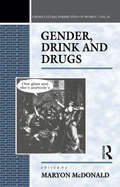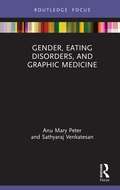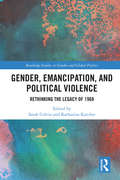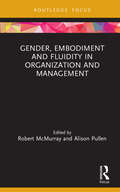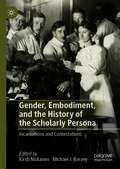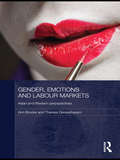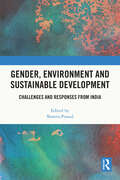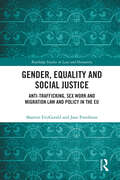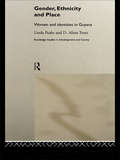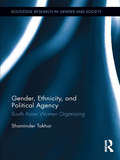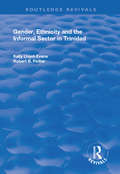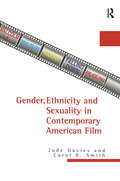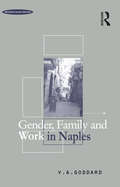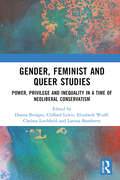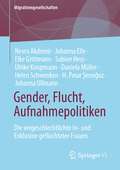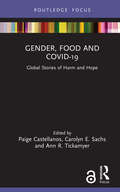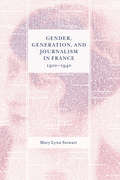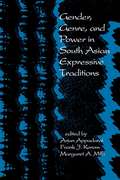- Table View
- List View
Gender, Dating and Violence in Urban China (Routledge Culture, Society, Business in East Asia Series)
by Wang XiyingThis book explores young people’s experiences of, and views on, dating, gender, sexuality, sexual hegemony and violence within dating relationships. Based on interviews and focus groups conducted in Beijing over a decade, and focusing especially on dating violence, the book reveals provides insights into a wide range of issues of gender and sexuality in contemporary China. It shows how young Chinese people’s attitudes and behaviors are changing as urban China develops rapidly, and how their experience of dating violence and meaning-making are affected by age, gender, location and class.
Gender, Democracy and Institutional Development in Africa (Gender, Development and Social Change)
by Njoki Nathani WaneThis book analyses African foundations of gender, education, politics, democracy and institutional development by stimulating theoretical discourses. It offers a discursive framework on ways to examine the conceptualizations of African social development and a critical discourse on debunking the misconceptions that are attached to African location in the global arena. The volume challenges the danger of minimizing and oversimplifying the role of Africa in the international space. This will be ideal for researchers, students and scholars in the areas of African and gender studies, development, politics and education.
Gender, Development and Environmental Governance: Theorizing Connections (Routledge Research in Gender and Society #33)
by Seema Arora-JonssonA major challenge in studies of environmental governance is dealing with the diversity of the people involved at multiple levels – villagers, development agents, policy-makers, private resource users and others – and taking seriously their aspirations, conflicts and collaborations. This book examines this challenge in two very disparate parts of our world, exploring what gender-equality, resource management and development mean in real terms for its inhabitants as well as for our environmental futures. Based on participatory research and in-depth fieldwork, Arora-Jonsson studies struggles for local forest management, the making of women’s groups within them and how the women’s groups became a threat to mainstream institutions. Insights from India, consistently ranked as one of the most gender-biased countries, are compared with similar situations in the ostensibly gender-equal Sweden. Arora-Jonsson also analyzes how dominant ideas about the environment, development and gender equality shape the spaces in which women and men take action through global discourses and grassroots activism. Questioning the conventional belief that development brings about greater gender equality and more efficient environmental management, this volume scrutinizes how environmental imaginations are key to crafting gender relations. It shows gender to be at the heart of environmental negotiations while at the same time making a case for environmental sensibilities as integral to gender relations. At the confluence of development, environmental and gender studies, the book contributes to a much-needed dialogue between these fields, proposing new futures in environmental management.
Gender, Development, and the State in India (Routledge Research on Gender in Asia Series)
by Carole SparyThis book explores the relationship between the state, development policy, and gender (in)equality in India. It discusses the formation of state policy on gender and development in India in the post-1990 period through three key organising concepts of institutions, discourse, and agency. The book pays particular attention to whether the international policy language of gender mainstreaming has been adopted by the Indian state, and if so, to what extent and with what results. The author examines how these issues play out at multiple levels of governance – at both the national and the subnational (state) level in federal India. This comparative aspect is particularly important in the context of increasing autonomy in development policymaking in India in the 1990s, divergent development policy approaches and outcomes among states, and the emerging importance of subnational state development policies and programmes for women in this period. The author argues that the state is not a monolith but a heterogeneous, internally differentiated collection of institutions, which offers complex and varying opportunities and consequences for feminists engaging the state. Demonstrating that the Indian empirical case is illuminating for studies of the gendered politics of development, and international debates on gender mainstreaming, the book highlights the politics of negotiating gender equality strategies in the contemporary context of neo-liberal development and brings together complex issues of modernity, postcolonialism, identity politics, federalism, and equality within the broader context of the world’s largest democracy. This book will be of interest to scholars interested in the politics of gender equality, state feminism, and gender mainstreaming; federalism and multi-level governance; and development studies and gender in South Asia.
Gender, Digitalization, and Resilience in International Development: Failing Forward (Routledge Explorations in Development Studies)
by Julia Bello-Bravo John William Medendorp Anne Namatsi Lutomia Barry Robert PittendrighThis book explores the intersection of gender, digitalization, and resilience in international development. Building resilience is increasingly seen as crucial when planning and implementing development programmes, enabling communities to mitigate, adapt to, and recover from shocks and stresses in a manner that reduces chronic vulnerability and facilitates inclusive growth. Gender plays a crucial role in the resilience of development systems, as the exclusion of women from participation can make communities more vulnerable to economic shocks, perpetuating and even worsening current levels of poverty, instability, and insecurity. Drawing on meta-data from across the world, as well as specific case studies from Ghana, Kenya, Burkina Faso, and Mozambique, this book reflects on these intersections and the potential of digitalization as a democratizing tool for improving the access of women and other marginalized groups to information vital for their participation in the process of development. By outlining the importance of digitalization for addressing gender imbalances, this book draws the evidentiary lines between the role of digitalization for women and resilience as a whole. This book will be of interest to development practitioners and policy makers, as well as researchers with specialisms in gender inclusion, resilience, digitalization, and international development.
Gender, Disability, and Tourism in Africa: Intersectional Perspectives (Sustainable Development Goals Series)
by Erisher Woyo Hellen VenganaiThis book explores the intersection of gender and disability in the context of tourism. In part, the book foregrounds feminist theorising of intersectionality by examining how gender can overlap with other social identities to contribute to more systemic oppression, domination, discrimination, and marginalisation of certain categories of people. Our point of departure is that disability does not operate in isolation as it is constituted and experienced within an already gendered social and tourism environment. With substantial research on the intersection of gender and tourism on the one hand, and the intersection of disability and tourism on the other hand, the interconnectedness of gender and disability and the implications this has on tourism policy and practice remains understudied. Thus, the book provides a critical lens that helps unpack underlying assumptions about gender and disability while questioning the dominant ideas about gender and disability reproduced through tourism policies and institutional practices in an African context. This book will be of interest to scholars and researchers in Gender Studies, Disability Studies, and Tourism Studies, particularly those with a research interest in Africa.
Gender, Displacement, and Cultural Networks of Galicia: 1800s to Present
by Obdulia Castro Diego Baena María A. Rey López Miriam Sánchez MoreirasThis book, bringing together a multi-voiced dialogue between academic scholars and professionals from diverse fields, shares a comprehensive and heterogeneous look at the interdisciplinarity of Galician Studies while examining a chronologically broad range of subjects from the 1800s to the present. This volume carves out a distinct approach to gender studies investigating issues of culture, language, displacement, counterculture artists, and community projects as related to questions of politics, gender and class. Women, conceived as both individual and political bodies, are studied, among other things, as an example of what it means to struggle from the margins emphasizing the importance of looking at the opposition between the center and the peripheries when studying the relationship between space and culture.
Gender, Drink and Drugs (Cross-cultural Perspectives On Women Ser. #Vol. 10)
by Maryon McDonaldWhy do so many people feel compelled to drink alcohol or take drugs? And why do so many men drink and so many women refrain? Using ideas from social anthropology, this book attempts to provide a novel answer to these questions. The introduction surveys both gender and addiction. It points out that we cannot say what men or women are really like, in any culturally innocent sense, for gender is always, even in the realm of biology, a cultural matter. The ethnographic chapters, ranging from Ancient Rome to modern Japan, similarly suggest how any substance - from alcohol to tea to heroin - inevitably takes its meaning or reality in the cultural system in which it exists.This book will be of interest to medical anthropologists, medical sociologists, anyone with an interest in the contemporary direction of anthropology as well as those working in the fields of alcohol and addiction.
Gender, Eating Disorders, and Graphic Medicine
by Sathyaraj Venkatesan Anu Mary PeterDeveloping an understanding of eating disorders beyond the biological/medical framework has become a necessity in present times, especially when eating disorders are swiftly spreading deep roots across the world. In view of the multidimensional etiology of eating disorders, there are increased efforts towards understanding its phenomenological, cultural, and other related non-medical aspects, and Gender, Eating Disorders, and Graphic Medicine leaps past the prevalent notions on eating disorder, and contributes to the developing corpus of affective knowledge on eating disorders among women through comics and graphic medicine. Taking cues from select graphic narratives on eating disorders, this book attempts to posit graphic medicine as one of the most befitting modes of life writing. This book is distinctive in that it is an attempt not only to explore the multi-dimensional etiology of eating disorders in women using graphic medicine narratives but also to understand how graphic medicine humanizes eating disorders by offering a unique ingress into women’s phenomenological experience of eating disorders.
Gender, Emancipation, and Political Violence: Rethinking the Legacy of 1968 (Routledge Studies in Gender and Global Politics)
by Sarah Colvin Katharina KarcherThis volume presents and interrogates both theoretical and artistic expressions of the revolutionary, militant spirit associated with "1968" and the aftermath, in the specific context of gender. The contributors explore political-philosophical discussions of the legitimacy of violence, the gender of aggression and peaceability, and the contradictions of counter violence; but also women’s artistic and creative interventions, which have rarely been considered. Together the chapters provide and provoke a wide-ranging rethink of how we read not only "1968" but more generally the relationship between gender, political violence, art and emancipation. This work will be of great interest to students and scholars of protest and violence in the fields of history, politics and international relations, sociology, cultural studies, and women’s studies.
Gender, Embodiment and Fluidity in Organization and Management (Routledge Focus on Women Writers in Organization Studies)
by Alison Pullen Robert McMurrayThis third volume in the Routledge Focus on Women Writers in Organization Studies series challenges us to think again about the implications of gender, embodiment and fluidity for organizing and managing. The themes of this book disrupt our understanding of dualisms between sex (men and women), gender (masculinity and femininity) and mind / body, and in so doing analyze the ways in which dominant power relations constitute heteronormativity throughout organizational history, thereby reinforcing mainstream management research and teaching. By centring the work of women writers, this book gives recognition to their thinking and praxis; each writer making political inroads into changing the lived experiences of those who have suffered discrimination, exclusion and marginalization as they consider the ways in which organizational knowledge has tended to privilege rather than problematize masculinity, fixity, control, normativity, violence and discrimination. The themes and authors (Acker, de Beauvoir, Halberstam, Kosofsky Sedgwick, Kristeva, Yourcenar) covered in this book are important precisely because they are not generally encountered in mainstream writing on management and organization studies. They are significant to the study and analysis of organizations because they demonstrate how our understanding of managing and organizing can be transformed when other voices/bodies/genders write on what it is work, live, lead and relate to self and others. All the writers turn to the ways in which individuals matter organizationally, acknowledging that lived experiences are a source of political and ethical practice. Each Woman Writer is introduced and analyzed by experts in organization studies. Further reading and accessible resources are also identified for those interested in knowing more. This book will be relevant to students, researchers and practitioners with an interest in business and management, organizational studies, critical management studies, gender studies and sociology. Like all the books in this series, it will also be of interest to anyone who wants to see, think and act differently.
Gender, Embodiment, and the History of the Scholarly Persona: Incarnations and Contestations
by Kirsti Niskanen Michael J. BaranyThis book investigates the historical construction of scholarly personae by integrating a spectrum of recent perspectives from the history and cultural studies of knowledge and institutions. Focusing on gender and embodiment, the contributors analyse the situated performance of scholarly identity and its social and intellectual contexts and consequences. Disciplinary cultures, scholarly practices, personal habits, and a range of social, economic, and political circumstances shape the people and formations of modern scholarship. Featuring a foreword by Ludmilla Jordanova, Gender, Embodiment, and the History of the Scholarly Persona: Incarnations and Contestations is of interest to historians, sociologists, media and culture scholars, and all those with a stake in the personal dimensions of scholarship. An international group of scholars present original examinations of travel, globalisation, exchange, training, evaluation, self-representation, institution-building, norm-setting, virtue-defining, myth-making, and other gendered and embodied modes and mechanisms of scholarly persona-work. These accounts nuance and challenge existing understandings of the relationship between knowledge and identity.
Gender, Emotions and Labour Markets - Asian and Western Perspectives: Asian And Western Perspectives (Routledge Studies in Social and Political Thought)
by Ann Brooks Theresa DevasahayamConcepts of emotion and emotional labour have largely been defined in European and American terms and according to Euro-American sensibilities with little attention given to the question of whether emotional work or emotional labour is different globally. In particular little has been written about the issue of what defines emotions and emotional labour in public work contexts and how it is configured in different cultural contexts. Gender, Emotions and Labour Markets considers how, and in what ways, emotional labour characterises formal and informal work environments in both Asia and the West. Key themes covered include: human rights issues and gender equity in formal and informal work contexts in Asia and the West; men, masculinity and emotional labour; impact on the work-life balance of professional women in Asian and Western contexts; the impact of the ‘feminization of migration’ in servicing high-end economic professionals; the impact of the new economy, organizational constraints on labour markets; and demographic patterns such as fertility, procreation, marriage, divorce in both Asian and Western contexts.
Gender, Environment and Sustainable Development: Challenges and Responses from India
by Shweta PrasadThis book studies environment and sustainable development from the perspective of gender. It focuses on three major themes, including sustainability of development practices, policy perspectives on environmental management and climate change and its gendered impact. It includes contributions from academicians working across disciplines and practitioners working at the grassroots levels. The book addresses issues facing India amid a growing global environmental crisis and suggests policy measures for environmental protection and to improve the quality of life of its inhabitants. Lucid and topical, the volume will be an indispensable resource for students, researchers of gender, environment and sustainable development, sociology and public policy. It will also be a great resource for advocacy groups, non-governmental organisations (NGOs) and policymakers working in the area.
Gender, Equality and Social Justice: Anti Trafficking, Sex Work and Migration Law and Policy in the EU (Routledge Studies in Law and Humanity)
by Jane Freedman Sharron FitzGeraldThis book addresses a gap in both contemporary theorising and empirical analysis of the European Union’s (EU) law and policy frameworks on migration, sex work and anti trafficking. Drawing on the authors’ previous research on these policies and with their practical experience of engaging with various EU institutions in law and policy-making fora around gender, equality and justice, the work examines the processes involved in constructing and enacting policy frameworks and legal interventions on these issues, within a feminist analytical framework. The authors map how EU agenda-setting operates, and detail the roles that various EU institutions, external groups and actors, including non-governmental organisations, play in promoting or blocking policy on these three issues. The book draws on feminist theorising on gender, policy-making and social justice to develop a general theoretical framework to help us understand how and why a consensus has seemingly been achieved at EU level on what constitutes gender equality in these three policy areas. The book presents a valuable resource for academics, researchers and policy makers in Law, Migration, EU policy making and Gender Studies.
Gender, Ethnicity and Place: Women and Identity in Guyana (Routledge Studies in Development and Society)
by Linda Peake D. Alissa TrotzThis book is concerned with the nature of the relationship between gender, ethnicity and poverty in the context of the external and internal dynamics of households in Guyana. Using detailed data collected from male and female respondents in three separate locations, two urban and one rural, and across two major ethnic groups, Afro-Guyanese and Indo-Guyanese, the authors discuss the links between gender and race, exploring development issues from a feminist perspective.
Gender, Ethnicity and Political Agency: South Asian Women Organizing (Routledge Research in Gender and Society #35)
by Shaminder TakharThis book examines how South Asian women’s collective agency is operationalized through civic organizations in the UK. Drawing on black feminist theory and third world feminism, it shows the complexity of political agency and its relationship to identity and subjectivity, and uses empirical research to demonstrate how women are empowered to resist domination. The historically racialized image of the South Asian woman as lacking in political agency is challenged through their long history of activism on the Indian subcontinent. The creation of "critical spaces" by South Asian women in the diaspora places them as active agents who have successfully influenced social policy on important issues such as forced marriage, domestic violence and sexuality. The engagement with the empirical data demonstrates the significance and impact of race, racism, sexism and religion on the lives of the women. The book brings to the fore the pursuit of equality, rights and justice, including multiculturalism and the often debated emancipatory role of religion.
Gender, Ethnicity and the Informal Sector in Trinidad
by Robert B. Potter Sally Lloyd-EvansThis title was first published in 2002. Throughout much of the developing world and especially in Africa and Latin America, the informal employment sector is growing spectacularly. This study focuses on the gender and ethnic aspects of the informal economy in Trinidad.
Gender, Ethnicity, and Sexuality in Contemporary American Film (Baas Paperbacks Ser. #Vol. 5)
by Jude Davies Carol R. SmithFirst Published in 2000. Routledge is an imprint of Taylor & Francis, an informa company.
Gender, Family and Work in Naples
by Victoria A. GoddardBreaking new ground in Mediterreanean anthropology, this book rejects the discipline's traditional focus on honour and shame in small face-to-face communities, and suggests instead that gender and sexuality interact with material processes in the constitution of personal and social identities. In this ethnographic account of the labour market in Naples, the author shows how cultural definitions of gender can be used to investigate broad social processes. Scarce stable employment in the area means that household members are forced to diversify their economic activities in order to survive. Petty entrepreneurship is an option which is almost exclusively available to men. Women, who are either unable or unwilling to obtain factory work, are generally confined to the status of outworkers. The author emphasises that individual choices cannot be attributed solely to economic opportunities but that concepts of selfhood, gender identity and the symbolic value of female sexuality are also important.
Gender, Feminist and Queer Studies: Power, Privilege and Inequality in a Time of Neoliberal Conservatism
by Donna Bridges Clifford Lewis Elizabeth Wulff Chelsea Litchfield Larissa BamberryExploring scholarship, research, practice and activism on gender, feminist and queer studies, this edited collection examines, analyses and critiques the nature and causes of inequality, disadvantage and marginalisation faced by women, non-hegemonic and LGBTIQA+ identities who do not fit hegemonic notions of masculinity, femininity and heteronormativity. The chapters in this book critically analyse and challenge visible and invisible power relations, privilege and prejudice by problematising the artificial organisation of people into hierarchies that preference hegemonic masculinities, white and heteronormative identities. In questioning often unchallenged and legitimised inequality and disadvantage, this book locates itself in the juxtaposition where the lived experiences of individuals, activism, community participation, research and scholarship collide with mainstream, local, national and globalised culture and politics. Divided into four parts, this book provides a platform for interrogating how social change can occur in the current neoliberal political context of increasing conservatism.
Gender, Flucht, Aufnahmepolitiken: Die vergeschlechtlichte In- und Exklusion geflüchteter Frauen (Migrationsgesellschaften)
by Helen Schwenken H. Pınar Şenoğuz Sabine Hess Elke Grittmann Nevra Akdemir Johanna Elle Ulrike Koopmann Daniela Müller Johanna UllmannFlucht- und Aufnahmeprozesse sind durchzogen von geschlechtsspezifischen und intersektionalen Dynamiken. Die Autorinnen haben diese und das darin zu Tage tretende Geschlechterwissen im Verbundforschungsprojekt „Gender – Flucht – Aufnahmepolitiken“ für die Themen Unterbringung, Gewaltschutz, Erwerbstätigkeit, Medien, Familie, ‚Heimischwerden‘ und Solidarität analysiert.Die migrationsbezogene Infrastruktur hat sich in der deutschen Migrationsgesellschaft auf die Bedarfe von Geflüchteten eingestellt. Geflüchtete machen mit den Angeboten vielfältige Erfahrungen, die von hilfreicher und solidarischer Unterstützung über wenig angepasste Angebote bis zu Exklusion und Diskriminierung reichen. Die rahmende Medienanalyse zeigt, wie tief die öffentliche und mediale Rezeption der sogenannten „Flüchtlingskrise“ durch vergeschlechtlichte Narrative geprägt ist, und wie diese die kommunale und ehrenamtliche Arbeit mit Geflüchteten mitprägen.Der Band richtet sich an Interessierte aus Studium, Forschung und Praxis, die sich mit Flucht, Migration und/oder Geschlechterverhältnissen befassen.
Gender, Food and COVID-19: Global Stories of Harm and Hope (Routledge Focus on Environment and Sustainability)
by Paige Castellanos, Carolyn E. Sachs and Ann R. TickamyerThis book documents how COVID-19 impacts gender, agriculture, and food systems across the globe with on-the-ground accounts and personal reflections from scholars, practitioners, and community members. During the coronavirus pandemic with many people under lockdown, continual agricultural production and access to food remain essential. Women provide much of the formal and informal work in agriculture and food production, distribution, and preparation often under precarious conditions. A cadre of scholars and practitioners from across the globe provide their timely observations on these issues as well as more personal reflections on its impact on their lives and work. Four major themes emerge from these accounts and are interwoven throughout: the pervasiveness of food insecurity, the ubiquity of women’s care work, food justice, and policies and research that can that can result in a resilience that reimagines the future for greater gender and intersectional equality. We identify what lessons we can learn from this global pandemic about research and practices related to gender, food, and agricultural systems to strive for more equitable arrangements. This book will be of great interest to students, scholars and practitioners working on gender and food and agriculture during this global pandemic and beyond.
Gender, Generation, and Journalism in France, 1910-1940
by Mary Lynn StewartIn the late nineteenth century, the first wave of female journalists began writing in the French daily press. Yet, while they undeniably opened doors for the next generations of educated women, sexist hiring practices, assumptions about women’s aptitudes as reporters, and more subtle gender biases continued to saturate the industry in the decades that followed. Gender, Generation, and Journalism in France, 1910–1940 investigates the careers and written work of ten women who regularly reported in the national, Paris-based dailies. Addressing the role of mentorship, family connections, gendered behaviours, reporting styles, and subject matter, Mary Lynn Stewart debunks lingering essentialist notions about women’s entry into journalism. She shows that struggling newspapers, attempting to reverse declining circulation, hired women to cover subjects that expanded to include international relations, colonial conflicts, trials, local politics, and social problems. Through content analysis, deixis, and systematic comparisons of several women and men reporting on the same or different events, she further queries claims about a feminine style, finding more similarities than differences between masculine and feminine reporting. Documenting the persistence of gender discrimination in the hiring, assigning, and assessment of women reporters in the French daily press, Gender, Generation, and Journalism in France, 1910–1940 demonstrates that, through the support of their female colleagues, women managed to succeed despite a variety of challenges.
Gender, Genre, and Power in South Asian Expressive Traditions
by Arjun Appadurai Frank J. Korom Mills Margaret AThe authors cross the boundaries between anthropology, folklore, and history to cast new light on the relation between songs and stories, reality and realism, and rhythm and rhetoric in the expressive traditions of South Asia.
